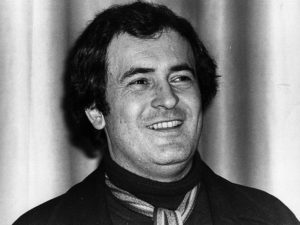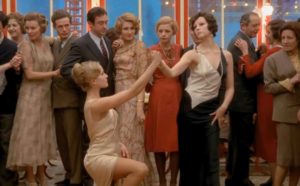 This past holiday weekend marked the passing of Bernardo Bertolucci and Nicolas Roeg, two great filmmaking provocateurs who rose to greatness in the 1970s. As a college student in the early 1980s, theirs were some of the first films to lure me outside the house of Hollywood and into the wide open, adventurous spaces of arthouse and international cinema. From Roeg (who died on Nov. 23 at the age of 90), it was such time-tripping, dreamy titles as The Man Who Fell to Earth (1976), Walkabout (1971) and Performance (1970), while Bertolucci (age 77 upon his death on Nov. 26) ran the gamut from politically charged offerings like The Spider’s Stratagem (1970) and The Conformist (1970) to the sexually charged drama of Last Tango in Paris to the monumental 1900, a sprawling epic of 20th Century Italy.
This past holiday weekend marked the passing of Bernardo Bertolucci and Nicolas Roeg, two great filmmaking provocateurs who rose to greatness in the 1970s. As a college student in the early 1980s, theirs were some of the first films to lure me outside the house of Hollywood and into the wide open, adventurous spaces of arthouse and international cinema. From Roeg (who died on Nov. 23 at the age of 90), it was such time-tripping, dreamy titles as The Man Who Fell to Earth (1976), Walkabout (1971) and Performance (1970), while Bertolucci (age 77 upon his death on Nov. 26) ran the gamut from politically charged offerings like The Spider’s Stratagem (1970) and The Conformist (1970) to the sexually charged drama of Last Tango in Paris to the monumental 1900, a sprawling epic of 20th Century Italy.
Back in 2005, I had the opportunity to speak with Bertolucci for the now-defunct DVD Exclusive Magazine. Our talk mostly focused on the DVD release of his 2003 film The Dreamers, so you’ll see a lot about DVD and commentary tracks here, but I can still remember the thrill of hearing him talking about Pasolini and Brando and Henri Langlois. The Conformist and, later on, The Last Emperor and The Sheltering Sky, were major films for me, which they remain. Mr. Bertolucci and Mr. Roeg shall both be missed.
Laurence Lerman: You’ve done commentary tracks for your two most recent films, Besieged and The Dreamers. Can we assume you’re a fan of the form?
Bernardo Bertolucci: I think they can be something really special when the director or writer or someone who been so close to the shoot does one. And they can be quite funny.
LL: Well, it sounds like you enjoyed yourself on The Dreamers commentary.
Bertolucci: I had great fun in doing it. It’s like moving in a dark room where you know all the positions of the furniture. You move through the memories of each scene, but what you remember of that scene is now what the actual viewers have seen. You remember other things. It can really be an additional pleasure.
LL: Like movies, commentaries are a highly subjective, personal experience
Bertolucci: In some ways, it is fascinating to have the occasion to talk to a mass of people about subjects that are very intimate. I would say that the difference between a DVD and a DVD with a commentary is that with a DVD commentary, you can reach your audience with things that are so personal and intimate that there would be no other way but the commentary to talk about them.
LL: Here’s hoping that there are special edition DVDs of your other films…Last Tango, The Spider’s Strategem, 1900… Speaking of which, how do you feel about participating on DVDs by other filmmakers?
Bertolucci: I like to do it sometimes. I was on the DVDs for [Pier Pasolini’s] Mamma Roma and [Sergio Leone’s] Once Upon a Time in the West. I think it’s a way of saying what I like about cinema and to remind the viewers that good cinema is always cinema that attempts to re-invent cinema. When I think of Martin Scorsese, he is always trying to find a new way to tell a story. Explaining this is something you can do better in a DVD.
LL: In The Dreamers, you exhibit an extraordinary amount of love and respect for Henri Langlois, the revered film historian and co-founder of the Cinémathèque Française. What do you think Langlois would have thought about DVDs and director’s commentary tracks.
Bertolucci: Henri was so much in love with cinema. When he wasn’t creating his Cinémathèque, he was creating a beautiful museum of cinema itself. He collected the first machines that were invented before cinema—zoetropes, kinescopes, all those things. Like every film buff, he was a fetishist. I think that commentaries are the perfect food for fetishists.
LL: He would have jumped right on them?
Bertolucci: Film fetishists, of course. I’m not talking about—
LL: —I know what you’re not talking about.

Leave a Reply